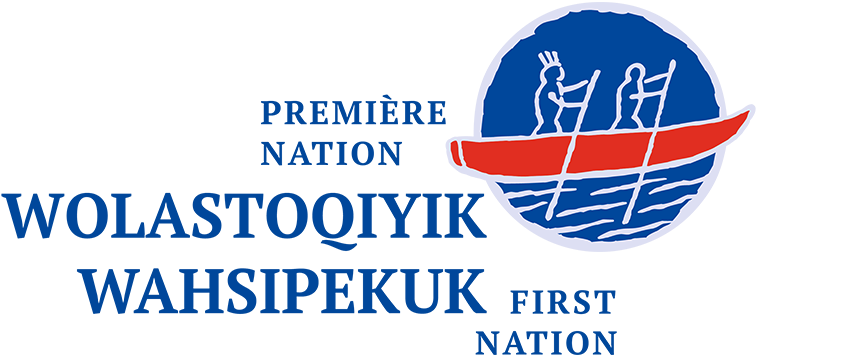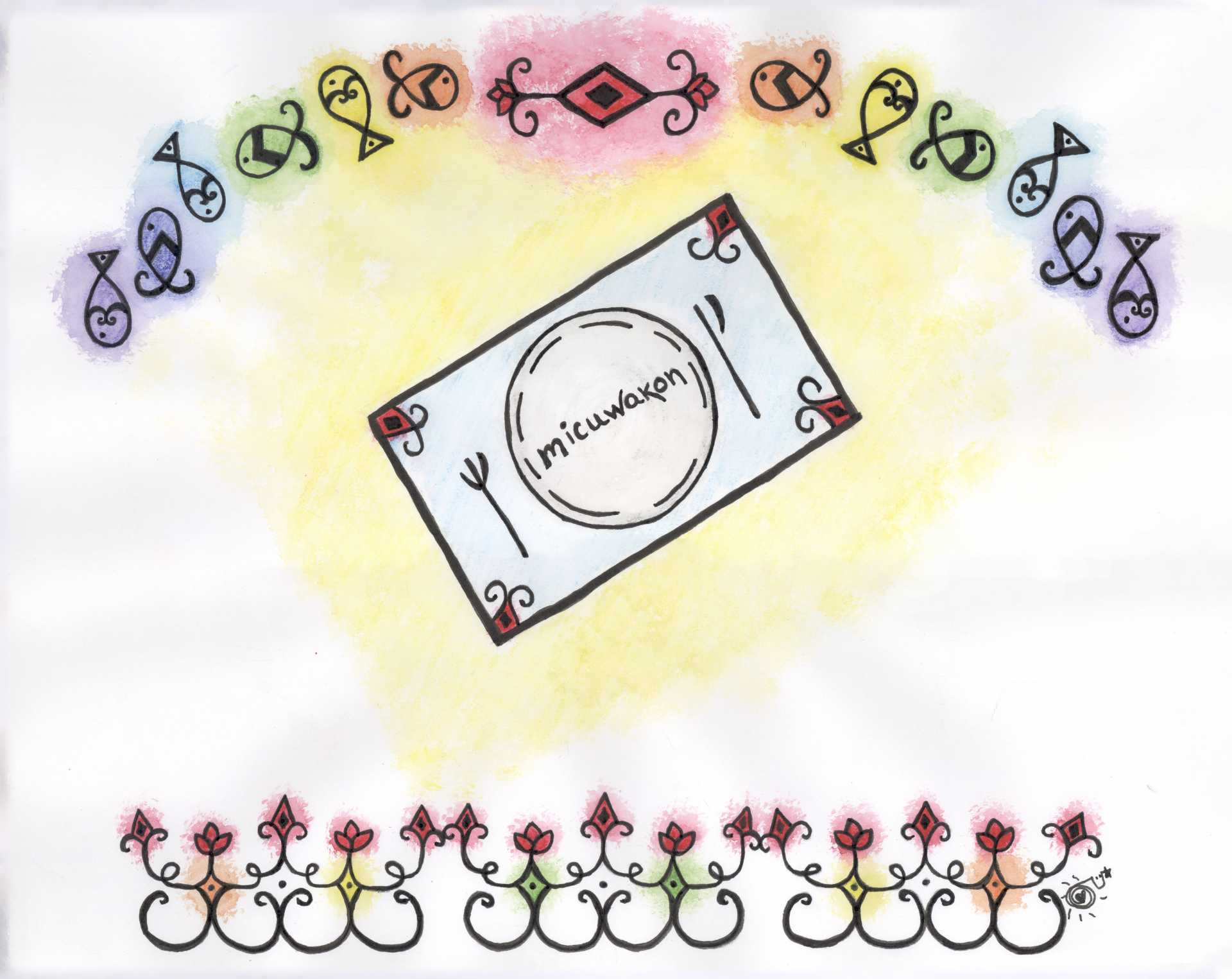


So many memories are built around a kitchen table. So much exchange takes place there. So much sharing, laughter, traditions. Food security for all human beings is a vital fight which must include the right to hunt, fish and other subsistence activities as well as sustainable use and development of Mother Earth resources.
Home / Module 4 / Food

Micuwakon naka mitsultimok wisokokimqotul ‘ci nilun eleyimok.

Food is an essential aspect of culture.
Tan eci maqahahtiyeq weci mitsultiyeq, minuwi ollukhotipon tahalu kansuhsok ellukhotihtihtpon askomiw.

When we gather together to share a meal, we practice a tradition passed down to us by our ancestors.
Mecimi-te Wolastoqiyik uci-miluwaniya micuwakon cika ote tan eci notuwok.

The Wolastoqewi people have always shared their food, even when it was scarce.
Amsqahseweyak Okamonuhkewiyik petapasihtihtpon ‘kihtakomikumon assokitahasultuwok kehsok micuwakon micihtit tan eci kisi koluwok kotunkahtimok.

The first Europeans who came to these lands were surprised by the size of the huge feasts that took place when the hunt was good.
Mawihpultin, mec-ote pemkiskahk, tan eci maqahamok naka olotahkewakonol tahalu Wolastoqey eleyimok.

Even to this day, sharing food together is an important part of many gatherings and ceremonies in the Wolastoqey tradition.
 ⎙
⎙
| Ihtolahqahtimok | La cuisine | The kitchen |


| |||
|---|---|---|---|---|---|---|
| Nutahqet | Un cuisinier | A cook |

|
|||
| Ntotolaq. | Je cuisine. | I am cooking. |

|
|||
| Ktotolaq. | Tu cuisines. | You are cooking. |

|
|||
| Ktotolaq? | Est-ce que tu cuisines? | Are you cooking? |

|
|||
| ‘Kisahq? | As-tu cuisiné? | Did you cook? |

|
|||
| Keq etoloqosomon? | Que cuisines-tu? | What are you cooking? |

|
|||
| Keq kisaqosomon? | Qu’as-tu cuisiné? | What did you cook? |

|
|||
| Keq oc ketuwaqosomon? | Que vas-tu cuisiner? | What will you cook? |

|
|||
| Mec-op-al ktolahq? | Vas-tu cuisiner? | Will you cook? |

|
|||
| Tama ktotolahq? | Où cuisines-tu? | Where are you cooking? |

|
| Micuwakon | Nourriture | Food |


| |||
|---|---|---|---|---|---|---|
| Opan | Pain | Bread |

|
|||
| Lakalet | Banique | Frybread, bannock |

|
|||
| Pocetes | Patate | Potato |

|
|||
| Wiyuhs | Viande | Meat |

|
|||
| Otuhkey | Viande de cerf | Deer meat |

|
|||
| Musey | Viande d’orignal | Moose meat |

|
|||
| Ehemuwey | Poulet | Chicken |

|
|||
| Nomehsey | Poisson (chair) | Fish meat |

|
|||
| Polamuwey | Saumon (chair) | Salmon meat |

|
|||
| Kihkaney | Fruit ou légume | Fruit or vegetable |

|
|||
| Wawon | Œuf | Egg |

|
| Tokec | Présent | Present tense |


| |||
|---|---|---|---|---|---|---|
| Ktotolaq? | Est-ce que tu cuisines? | Are you cooking? | ||||
| Aha. Ntotolaq. | Oui. Je cuisine. | Yes. I am cooking. |

|
|||
| Ontama. Ma-te ntotolahqew. | Non. Je ne cuisine pas. | No. I’m not cooking. |

|
|||
| Keq etolaqosomon? | Que cuisines-tu? | What are you cooking? | ||||
| Ntotolaqosomon wiyuhs. | Je cuisine de la viande. | I’m cooking meat. |

|
|||
| Ntololaqosomonol pocetesol. | Je cuisine des patates. | I’m cooking potatoes. |

|
|||
| Ntotolaqosomonol wawonol. | Je cuisine des œufs. | I’m cooking eggs. |

|
| Kisi | Passé | Past tense |


| |||
|---|---|---|---|---|---|---|
| Kisahq? | As-tu cuisiné? | Did you cook? | ||||
| Aha. Nkisahq. | Oui. J’ai cuisiné. | Yes. I cooked. |

|
|||
| Ontama. Ma-te nkisahqew. | Non. Je n’ai pas cuisiné. | No. I have not cooked. |

|
|||
| Keq kisaqosomon? | Qu’as-tu cuisiné? | What did you cook? | ||||
| Nkisaqosomon musey. | J’ai cuisiné de la viande d’orignal. | I cooked moose meat. |

|
|||
| Nkisaqosa opan naka ksap. | J’ai cuisiné du pain et de la soupe. | I cooked bread and soup. |

|
|||
| Nkisaqosomon ehemuwey naka piyeskomonol. | J’ai cuisiné du poulet et du maïs. | I cooked chicken and corn. |

|
| Koti | Futur | Future tense |


| |||
|---|---|---|---|---|---|---|
| Mec-op-al ktlolahq? | Vas-tu cuisiner? | Will you cook ? | ||||
| Ontama. Ma-te nkotuwahqew. | Non. Je ne vais pas cuisiner. | No. I won’t cook. |

|
|||
| Aha. Ntlolahq oc. | Oui. Je vais cuisiner. | Yes, I will cook. |

|
|||
| Keq ketuwaqosomon? | Que vas-tu cuisiner? | What will you cook? | ||||
| Ntolaqosomonol oc wawonol. | Je vais cuisiner des œufs. | I will cook eggs. |

|
|||
| Ntolaqsomon oc othuhkey. | Je vais cuisiner de la viande de cerf. | I will cook deer meat. |

|
| Ihtolihpultimok* | Salle à manger* | Dining room * |


| |||
|---|---|---|---|---|---|---|
| * ‘Ciw yut tan tehpu tama ihtolihpultimok. | * Cette expression fait aussi référence à tout endroit où l’on mange, par exemple un restaurant. | *This expression is also used to refer to places where one eats such as a restaurant. | ||||
| Spasihpultin | Déjeuner | Breakfast |

|
|||
| Pasqihihpultin | Diner | Lunch |

|
|||
| Wolaqihpultin | Souper | Supper |

|
|||
| Wisahp! | Dépêche-toi! Mange! | Hurry up and eat! |

|
|||
| Mits! | Mange! | Eat! |

|
|||
| Mitsiq! | Mangez (deux personnes)! | Eat! (2 people) |

|
|||
| Mitsultiq! | Mangez (trois personnes ou plus)! | Eat! ( 3 people or more) |

|
|||
| Mawihpultine. | Mangeons tous ensemble. | Let’s all eat together. |

|
|||
| Nisihpine. | Mangeons ensemble. (toi et moi) | Let’s eat together. (you and me) |

|
|||
| Wolicuwehtahs. | Mets la table. | Set the table. |

|
|||
| Macephan ktahtuwalot ihtololahqahtimok. | Apporte ton assiette à la cuisine. | Take your plate to the kitchen. |

|
| Minuwokehkims wici papehcikesuwakonol naka asitewtomuwakonol. | Entraîne-toi avec des questions et des réponses. | Practice with questions and answers. |


| |||
|---|---|---|---|---|---|---|
| Kotuhp? | As-tu faim? | Are you hungry? | ||||
| Ontama. Ma-te nkotuhpiw. | Non. Je n’ai pas faim. | No. I’m not hungry. |

|
|||
| Aha. Nkotuhp. Mawipultine. | Oui. J’ai faim. Allons manger. (tous ensemble) | Yes. I’m hungry, let’s go eat. (all together) |

|
|||
| Aha. Nkotuhp. Ntoli ihtolihpultimok. | Oui. J’ai faim. Je vais au restaurant. | Yes, I’m hungry, I’m going to the restaurant. |

|
|||
| Aha. Nkotuhp. Naci-nisiw spasihpine. | Oui. J’ai faim. Allons déjeuner ensemble. (toi et moi) | Yes, I’m hungry, let’s go eat breakfast together (you and me). |

|
|||
| Koti maha opan? | Veux-tu manger du pain? | Do you want to eat bread? | ||||
| Aha. Nkoti-maha opan. | Oui. Je veux manger du pain. | Yes. I want to eat bread. |

|
|||
| Ontama. Ma-te nkoti-mahaw opan. | Non. Je ne veux pas manger de pain. | No. I don’t want to eat bread. |

|


| ||||||
|---|---|---|---|---|---|---|
| Kis kisihp? | As-tu déjà mangé? | Did you eat yet? | ||||
| Aha. Kis nkisihp. | Oui. J’ai mangé. | Yes. I ate. |

|
|||
| Aha. Ntoli kisihp nuhkumossok. | Oui. Je suis allé(e) manger chez notre grand-mère. | Yes, I ate at my grandmother’s. |

|
|||
| Wolihpuksu? | Est-ce que c’était bon? | Was it good? | ||||
| Aha. Wolihpuksu lakalet. | Oui. La banique est bonne. | Yes, the frybread is good. |

|
|||
| Ontama. Ma-te wolihpuksuwiw. | Non. La banique n’est pas bonne. | No. The frybread is not good. |

|